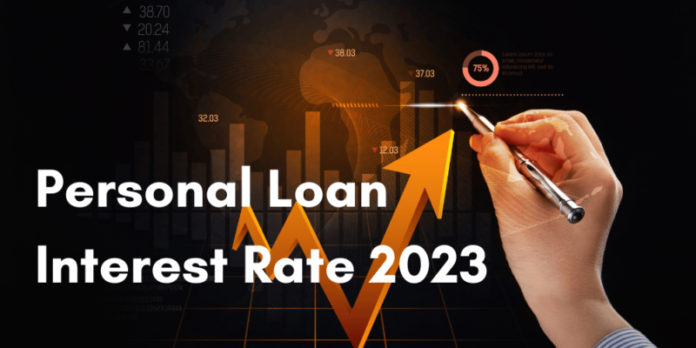
Personal Loans are a type of unsecured loan that individuals can use for various purposes, such as consolidating debt, financing a large purchase, or covering unexpected expenses. They typically have fixed interest rates and repayment tenures, as agreed by the borrower. The borrower’s credit worthiness and income are usually the primary factors that lending institutions consider when deciding whether to approve a loan application.
Factors Determining The Personal Loans Interest Rates

In 2023, Personal Loans will continue to be widely available from the top lending institution and digital NBFCs, with varying interest rates and terms depending on the borrower’s financial profile.
Personal Loan interest rates may vary due to a variety of reasons, including:
- Changes in Market Conditions:
Changes in market conditions can be important for Personal Loans. The affect the interest rates and availability of loans. When market conditions are favourable, such as when interest rates are low and the economy is strong, borrowers can obtain loans at more favourable rates and with better terms.
Conversely, during such market conditions, such as an economic recession or when interest rates are high, NBFCs may be more cautious in issuing loans. Borrowers may have to pay higher interest rates or face more stringent requirements to qualify for a loan. So, changes in market conditions can impact the cost and availability of Personal Loans. - Fluctuations in Economic Conditions:
Prevailing economic conditions often influences the personal loan interest rates. The rates may be high or low depending on the state of the economy in the country. This will affect the cost of the loan a borrower has to pay. - Employment Credibility:
When you apply for a personal loan from a lending institution, employment credibility can significantly impact the loan terms. They may look at the applicant’s job stability and income to determine their ability to repay the loan. They may also consider the reputation and financial stability of the applicant’s employer, as this can indicate the likelihood of continued employment and income.- A borrower with a stable job and income may be seen as a lower-risk borrower and more likely to be approved for a loan with favourable terms and interest rates.
- A borrower with a less stable employment history or working for an employer with a poor financial reputation may be seen as a higher-risk borrower and may have a harder time getting approved or may be charged higher interest rates and fees.
- Credit Score and Repayment History:
A credit score backed by a good repayment history can significantly impact a Personal Loan. NBFCs are more likely to offer lower interest rates and better loan terms to borrowers with good credit scores and a history of timely repayments.
This can result in lower monthly payments, a lower total cost of borrowing, and increased borrowing capacity.
On the other hand, borrowers with poor credit scores and a history of late or missed payments may have difficulty qualifying for a loan. They may be offered higher interest rates with more stringent loan terms. - Repayment Timeline:
Your repayment timeline can affect Personal Loan interest rates in several ways. Typically, longer repayment tenures result in higher interest rates, as the lending institutions take on more risk over a longer period. Shorter repayment timelines may result in lower interest rates, as the NBFC’s risk is reduced with a quicker repayment period.
Ultimately, the impact of the repayment timeline on Personal Loan interest rates will depend on the lending institution’s policies and the borrower’s financial situation.
How Are NBFCs Going To Be A Game Changer For Personal Loans In 2023?

NBFCs (Non-Banking Financial Companies) are expected to continue playing a significant role in the Personal Loan segment. They may continue to innovate and offer new loan products and features that cater to the needs of consumers.
Additionally, technological advancements may allow NBFCs to streamline the loan application process, making it faster and more convenient for borrowers. However, any predictions or projections about the future are subject to change based on various factors, including market conditions, regulatory changes, and technological advancements.
NBFCs may be a better place to apply for a personal loan for several reasons, including:
- Faster processing time: NBFCs often have streamlined processes that allow them to process loan applications quickly, providing faster access to funds.
- Flexible eligibility criteria: NBFCs usually have easier eligibility criteria, making it easier for borrowers to qualify for a Personal Loan.
- Customized loan offerings: NBFCs may offer more customized loan offerings that meet the unique needs of their customers. Such as loan amounts of up to Rs 10 lakhs, repayment tenure of 12-48 months and competitive interest rates.
- Minimal documentation: NBFCs may require less documentation than traditional financial institutions, making the loan application process less burdensome.
However, it’s important to research and check the terms and rates of Personal Loans offered by top lending institutions.
Conclusion
Personal loan interest rates are decided based on various economic factors, including inflation rates, monetary policies, and market competition. While it is difficult to predict exactly how interest rates will change in 2023, it is reasonable to expect some fluctuation.
As a borrower, staying updated and looking around for the best interest rates and terms to ensure you can access loans that meet your needs and budget is essential.Overall, staying financially responsible and being mindful of loan terms and interest rates will remain crucial for individuals seeking personal loans this year.
ALSO READ: 3 Basic Investment Tips For How To Allocate Your Funds










